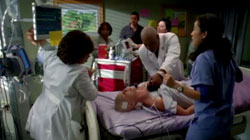
The Ethics of Grey’s Anatomy
I know it’s silly and not realistic and more than a little soap opera-ish, but I’ll admit it: I’m kind of addicted to Grey’s Anatomy.
The show started during my first year of medical school, and I could measure the progress of my medical education by how many flaws I could identify in each episode. For starters, no one looks that good in scrubs (turns out each actor has a custom-made pair); no one goes into the OR without wearing eye protection; and there’s no such thing as a board-certified OB-GYN who also happens to do pediatric surgery. Not to mention what goes on in those call rooms. I’ve slept in them and trust me, sleep is the only thing that crosses anyone’s mind in the middle of the night during a 36-hour call. But of course it’s the escapism that makes the show worth watching—we like our glamorous physicians with their oh-so-not-real lives and loves. After all, if Meredith and Derek ever manage to work out their issues, will there even be a show?
Doctors with perfect hair might make for great television, but when the setting is a hospital, even a fictional one, I think there are times when accuracy might count for more than entertainment. The medical subplots of even the most frivolous television shows revolve around issues that are very real for a great many people. Communication studies have shown that public attitudes about disease and decisions about screening tests like mammograms can be influenced by watching medical dramas. In the case of breast cancer awareness, this phenomenon of edutainment can work for the public good. When information about an issue of critical importance is not entirely accurate, problems arise.

Signing a DNR order is a big deal. Many of the most difficult conversations in the wards of any hospital center around a patient’s “code status.” The decision to become DNR reflects a patient’s wishes about death; there are few more personal and poignant decisions. As a member of the medical team, I also know that we spend a lot of time with patients and families talking about code status. When a DNR order is signed by a competent person, physicians absolutely do not have the right to revoke it.
Although most people have the impression from television and movies that a code almost always results in a good outcome, the reality is far different. Most people don’t just wake up and become themselves again—there’s unavoidable violence of cracking ribs and blood and tubes everywhere in that last-ditch effort to keep the heart pumping.
I realize that I am happily oblivious to the shortcuts portrayed in TV or films about any profession other than medicine, but I think the entertainment industry has an obligation to be accurate in matters of life and death.
Medicine happens to be what I know, and I know that real physicians don’t “screw the DNR.” Does that shortcut help make Grey’s Anatomy a great TV drama? Definitely. But is it an accurate representation of an enormously complex ethical question? I don’t think so.
